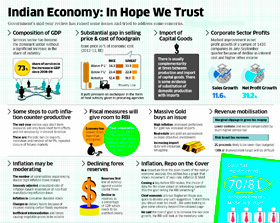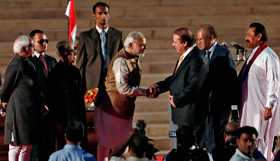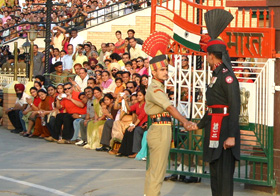Appointed as prime minister of India last May 25, Narendra Modi of the nationalist Bharatiya Janata Party (BJP) made it clear on his very first day in office that he was willing to improve relations with Islamabad, something that would take a lot of political will given the long-standing tensions in India-Pakistan relations.
In April 2014, people across India were anxiously awaiting general election results for Lok Sabha, the lower house of the country’s Parliament. This was the peak of the five-year political cycle, and was momentous in all respects, and was of epic – Bollywood – proportions in both the passions it excited and its duration (five weeks). The vote outcome seems unparalleled in Indian history, as the Indian National Congress (INC), in power since 2004, suffered a crushing defeat with the record post-independence low of 8.1 percent[1]. The winner was the nationalist BJP led by Mr. Modi, former governor of Gujarat state. It was a landslide, a highly unusual phenomenon in Indian parliamentary practice. The last time a party grabbed more than 50 percent of the vote was back in 1984.[2] Modi’s stunning victory is definitely of crucial importance for the world's largest democracy. Over the past few years, Manmohan Singh’s coalition government was paralyzed by numerous corruption scandals and strife between the ruling coalition and intransigent opposition factions. Modi's victory seems sufficiently convincing to overcome the domestic political crisis, while driving India out of its current foreign policy deadlock in relations with Pakistan might be somewhat more difficult.
The India-Pakistan Crisis
The INC's last term only exacerbated tensions between Delhi and Islamabad, and political dialogue stalled after the terrorist attacks in Mumbai on November 26, 2008, as the Lashkar-e-Taiba militants were found to have arrived from Pakistani territory.[3] Since then, the relationship has seen numerous events that do little to encourage a thaw – from open military confrontation and the brutal killings of Indian border guards, to the two countries’ top leaders trading personal insults.
Delhi will not resume full-fledged political dialogue, insisting that if relations are to normalize Islamabad must first punish the November 26 attackers; second, put an end to operation of terrorist cells in Pakistani territory; and, third, stop violating the line of control in Kashmir.[4]
Modi's Foreign Policy Agenda
Since 2001, Modi has enjoyed three consecutive terms as Gujarat governor and is said to have performed an economic miracle there, since his state grew into a real driver of India's growth. His campaign was built on the idea of rolling out the Gujarat model across the entire country to revive the national economy.[5] But while Modi's administrative talents are widely acknowledged, his diplomatic skills remain something of an unknown quantity.
With economics at the core of his campaign, the future premier was reticent about his foreign policies, occasionally criticizing Mr. Singh's government for dithering over territorial disputes with China and Pakistan.[6] The only relatively meaningful statement on international issues seems to have been made at the University of Madras on October 18, 2013.[7]
At that event Modi pointed out that he would like to follow in the footsteps of Atal Bihari Vajpayee, his BJP predecessor 1998-2004, whose foreign policy was a balanced combination of force and peaceful aspirations.[8] In May 1998, the Vajpayee government undertook a series of nuclear tests that saw India subject to international sanctions, while simultaneously launching a Pakistan-oriented peace initiative – with the signing of the Lahore Declaration intended to promote a peaceful settlement in Kashmir and to minimize the threat of the reciprocal use of nuclear weapons. Modi has also chastised the INC for its meek response to the terror attacks. Although the future prime minister refrained from going into any detail, he clearly hinted at Islamabad as the key agent – as its territory is known to be used by the Lashkar-e-Taiba and the Pakistani Taliban as a springboard for their operations.
Modi’s cabinet broadly views foreign policy as a secondary concern in the belief that international relations currently hinge on economic interests. Therefore, diplomacy is largely viewed as a tool for creating a supportive environment for structural reforms to India’s economy.
Inauguration Diplomacy
At the forefront of Indian politics for almost 15 years, Modi is no stranger to populism, although he is largely known for his pragmatic approach. So, his desire to normalize relations with India’s unfriendly neighbor is quite predictable.
However, out of all the leading candidates, Modi seems the most surprising figure to show an interest in resuming the dialogue with Islamabad, mostly because of the Indian nationalist image he has built up throughout his political career. He speaks remarkably good Hindi, even during foreign visits, something unusual for other leaders. The new prime minister wears traditional Indian garments in public and regularly comes to Indian holy sites for televised religious events.
The biggest psychological obstacle for the resumption of constructive relations between Delhi and Islamabad seems to lie in Modi’s difficult past. He is condemned by Muslims for involvement in the 2002 massacre of Muslims in Gujarat. Following that event, he was pronounced non grata in certain countries including the United States and some EU countries, and is widely disliked among India’s Muslim population. Hence, many in Pakistan would be at best unwilling to socialize with India’s new premier.
Nevertheless, immediately after taking office, Modi indicated his readiness to launch a dialogue with Pakistan. Pakistan’s Prime Minister Nawaz Sharif was invited to Modi’s May 25 inauguration in Delhi, and showed signs that a thaw in relations might be possible. He refrained from verbal attacks, praised the Indian capital by saying it looked like Lahore, and even presented a sari to Modi’s elderly mother. The following day, the two leaders discussed terrorism, the trial of Mumbai attack perpetrators, and bilateral trade, and the main outcome was an agreement to resume the peace dialogue on Kashmir in the spirit of the Lahore Declaration.[9]
The visit might have been rated as pure protocol and a show of respect to for a neighboring leader had it not been that precisely this diplomatic politeness has become a distinct rarity in the bilateral relationship. Hence, it indicates significant progress in Indian-Pakistani tensions in recent years.
Bilateral Prospects
Both Modi and Sharif appear keen on resuming political dialogue, with the former interested in seeing relations with Islamabad normalize in order to concentrate on key economic issues, and the latter needing room to focus on peace talks with the Taliban and restore calm in the country. As a well-known nationalist, Modi risks losing the support of his party elite and the electorate, while Sharif risks losing much more, as the country’s powerful top brass and Inter-Services Intelligence still wield extensive influence over the country’s foreign policy.[10]
Sharif has already been ousted once after a conflict with the military. In 1999, he was removed by General Pervez Musharraf, whom he accused of acting unilaterally and leading direct military confrontation with India in Kargil. The next civilian administration of President Asif Ali Zardari operated under the threat of a coup, as the secret memo to US Admiral Mike Mullen indicates.[11] Sharif returned to power in 2013 and became the country’s first civilian leader to take over from another civilian leader. Since this was only possible with the generals’ consent, Sharif has little choice but to heed their opinion regarding his international policy.
The Pakistani top brass derives strength from India’s role as an external enemy – an image that has been carefully cultivated by the security elite since Pakistan’s establishment – and is unwilling to sacrifice this lever over the civilian government and state budget (defense receives almost 20 percent of the total budget resources, and 2014-2015 will see these allocations increase 11 percent).[12] Sharif’s attempt to restart the India dialogue during his meeting with Singh in New York in September 2013 was virtually wrecked by the intransigently anti-Indian Chief of Army Staff General Ashfaq Kayani, as escalating actions by the Pakistani army at the line of control doomed the talks to failure. Hence, Islamabad’s India policy to a great extent will depend on the military, although there might be a silver lining in General Raheel Sharif, who became the Chief of Army Staff in 2014 and considers the Taliban a much greater threat than India.
Modi’s approach to Pakistan is not likely to significantly change from that of the INC, with the key difference lying in his openness to dialogue and a harsher response to Islamabad’s steps. As far as Kashmir is concerned, the BJP government is discussing cancellation of Article 370 of the Constitution that provides the state of Jammu and Kashmir with autonomy.[13] If that decision is taken, the ensuing unilateral change of its administrative status is highly likely to anger Pakistan and escalate the conflict.
Palpable progress is hardly likely on security issues, since the electorate would not allow Modi to squander the INC government’s conditions for resumption of dialogue. At the same time, Islamabad's concessions, such as the extradition of Pakistani citizens charged with the Mumbai attack to Indian legal jurisdiction, would be seen by the top brass as showing a lack of will and could provoke another military coup.
Despite principled approaches to security, the sides may advance on second-tier issues. It seems appropriate for Islamabad to consider potential profits from regional trade, since the imminent withdrawal of NATO forces from Afghanistan may diminish incoming foreign aid. So, the resumption of dialogue with Delhi seems an appropriate moment for extending MFN status to India. Since 2012, Islamabad has repeatedly declined to do this, with this decision most recently taken by Mr. Sharif in March 2014.[14] More interested in economy than in foreign policy, Modi is undoubtedly keen to promote regional cooperation. If the rapprochement is not limited to formal visits, most progress should be expected in the economic and cultural areas rather than in the military or political spheres.
[1] - Lok Sabha Elections 2014. Live Results // The Times of India // http://timesofindia.indiatimes.com/lok-sabha-elections-2014/elections2014.cms
[2] - Election Results 2014: India places its faith in Moditva // The Times of India – May 17, 2014 // http://timesofindia.indiatimes.com/news/Election-results-2014-India-places-its-faith-in-Moditva/articleshow/35224486.cms?
[3] - Pakistan ISI behind Mumbai attacks: India official // The Reuters. – July 14, 2010 // http:mobile.reuters.com/article/idUSTRE66D11720100714?irpc=932
[4] - Relations with Pakistan Pivoting // Dainik Bhaskar – May 23, 2014 // http://www.bhaskar.com/article/ABH-pakistan-and-complexity-of-relationships-bhaskar-editorial-4622532-NOR.html?seq=1
[5][5] - The Gujarat Model // Narendra Modi’s official website // http://narendramodi.in/the-gujarat-model/
[6] - Ankit Panda, Narendra Modi Gets Tough on China // The Diplomat. – 25 February, 2014 // http://www.thediplomat.com/2014/02/narendra-modi-gets-tough-on-china/
[7] - Shri Narendra Modi delivers memorial lecture on “India and the World”, Chennai – Speech // Narendra Modi’s official channel in YouTube – 18 October, 2013 // http://www.youtube.com/watch?v=zRgeAR2jXpE
[8] - Ibid.
[9] - The Modi-Sharif meeting Opens a New Chapter in Relations // Dainik Jagran – May 26, 2014 // http://www.jagran.com/news/national-sharif-in-india-for-mois-swearing-in-ceremony-11244148.html
[10] - Bharat Varma. Pakistani not Our Interests are at Stake // Dainik Jagran – June 2, 2014 // Mode of access: http://www.jagran.com/editorial/apnibaat-pakistans-interest-at-stake-11362531.html
[11] - Secret memo on Pakistan to Adm. Mike Mullen // The Washington Post // Mode of access: http://www.washingtonpost.com/wp-srv/world/documents/secret-pakistan-memo-to-adm-mike-mullen.html
[12] - Ankit Panda. Pakistan Expands Defense Budget // The Diplomat. – June 12, 2014. // Mode of access: http://thediplomat.com/2014/06/pakistan-expands-defense-budget/
[13] - BJP will scrap Article 370 // The Hindu. – March 26, 2014. // http://www.thehindu.com/news/national/andhra-pradesh/bjp-will-scrap-article-370/article4548368.ece







